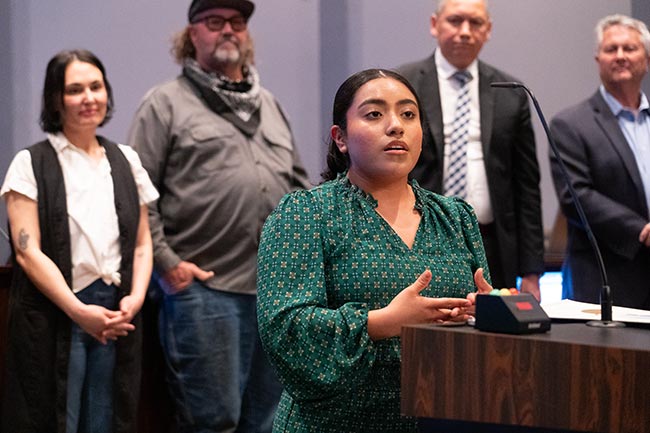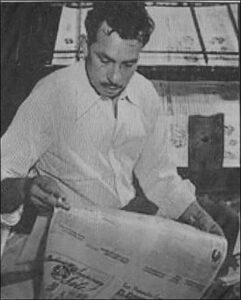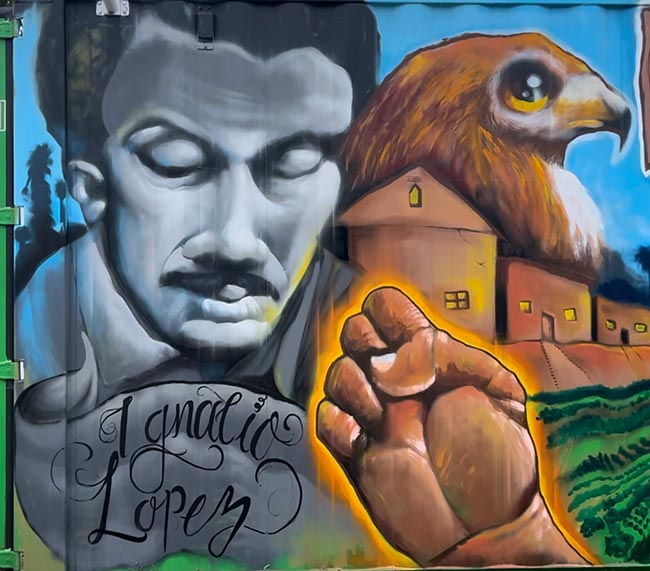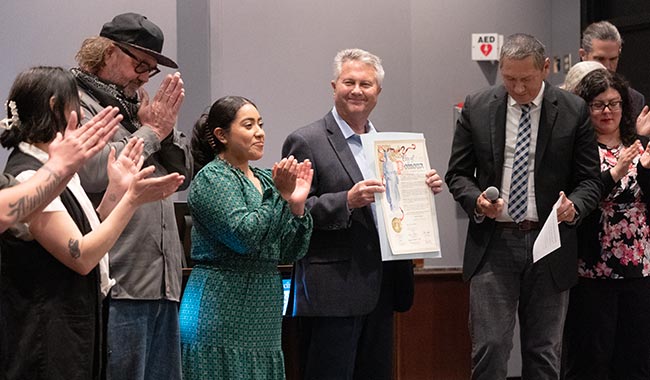Pomona salutes local civil rights hero

Raquel Salazar-Castillo speaks during Monday’s Pomona City Council meeting, at which the body designated March 19 as Ignacio Lopez Day. Courier photo/Andrew Alonzo
By Andrew Alonzo | aalonzo@claremont-courier.com
The Pomona City Council passed a proclamation Monday designating March 19 as Ignacio Lopez Day in honor of the late civil rights activist and longtime Pomona resident. Mayor Tim Sandoval presented staff from Lopez Urban Farm a certificate to mark the day, and Raquel Salazar-Castillo, a communications intern at the farm, thanked the city council for its special designation.
“The proclamation of Ignacio Lopez, it just comes as a demonstration that anything is possible despite your background, or despite where you come from,” Salazar-Castillo said. “You can always make a change in your community, even though you’re not from the community.”
The 19-year-old political science major at Cal Poly Pomona added Lopez’s legacy inspired her to pursue higher education in order to become an immigration lawyer. “He’s like that motivator to keep pursuing my education.”

Legendary civil rights pioneer Ignacio Lopez, pictured in 1944 in his offices at El Espectador. Photo/courtesy of Lisa Christie
March 19 marked the 116th anniversary of Lopez’s birth. Three days earlier, Lopez Urban Farm celebrated with remarks from Stephen Yorba, executive director of Community Partners 4 Innovation and LUF’s lead farmer, as well as José Calderón, a Pitzer College Professor Emeritus in sociology and Chicanx-Latinx studies and president of the Latino and Latina Roundtable. Calderón is well-versed on Lopez’s legacy and said it was the reason he spoke at the March 16 commemoration.
Born in 1908, Lopez immigrated to the United States from Guadalajara, Mexico, and moved to Pomona in the 1920s. The son of a Protestant minister father and homemaker mother, his father founded Pomona’s Mexican Congregational Church, known today as Urban Mission, at 810 White Ave.
Lopez graduated from Pomona High School in 1927, earned a bachelor’s degree from Pomona College four years later, and his master’s from U.C. Berkeley in 1932. He became a U.S. citizen in the 1930s and founded the Spanish language newspaper, El Espectador (The Spectator), in Pomona in 1933. He ran the paper until 1960 and used it as an “organizing tool,” Calderón said, to expose discriminatory policies in neighboring communities such as San Bernardino, Upland, and Ontario at the time.
Lopez was the main plaintiff in the landmark 1944 case, Lopez vs. Seccombe. The case was brought about after 13-year-old Mike Valles was refused entry to the Perris Hill municipal swimming pool because he was Mexican. The defense’s attorney, David C. Marcus, invoked the Fifth and Fourteenth Amendments and successfully sued San Bernardino mayor William Seccombe and the City of San Bernardino for unlawful racial practices that barred Mexicans from using public facilities.
“This was one of the early victories of his organizing [that] won an end to this segregation,” Calderón said. “He won that important case.”

A mural of Ignacio Lopez by artist Thundr One at Lopez Urban Farm. Photo/courtesy of Lisa Christie
Calderón pointed out that Lopez vs. Seccombe took place before the 1947 case, Mendez vs. Westminster, which put a stop to segregated schools in California. It was cited in Mendez v. Westminster, and planted the seed for the landmark Brown vs. Board of Education, which ended segregation in schools nationwide in 1954.
“I always say that it laid the foundation for these important national school desegregation cases,” Calderón said.
Lopez is also known for his grassroots protests against Ontario manufacturers who refused to hire Mexicans, as well as his columns often challenging discriminatory real estate developers’ tactics. “He led the protest then that forced the developers to remove racial covenants,” Calderón said.
He later got involved in shaping politics, managing Andres Morales’s successful Chino City Council election campaign in 1946. Lopez also formed the Unity League, an organization of 50 Mexicans from Pomona and Ontario that promoted Latino voting empowerment, and the Mexican American Political Association, which was known for training Latino organizers to run for political office.

(L-R) Lisa Christie, Stephen Yorba and Raquel Salazar-Castillo of Lopez Urban Farm, Council member Steve Lustro, Mayor Tim Sandoval, and Council members Nora Garcia, Elizabeth Ontiveros-Cole, and John Nolte, applaud after declaring March 19 Ignacio Lopez Day. Not pictured are Vice Mayor Victor Preciado and councilmember Robert Torres. Courier photo/Andrew Alonzo
Lopez died of a heart attack on July 4, 1973, during his tenure with the U.S. Department of Housing and Urban Development under then President Richard Nixon.
He is buried at Pomona Cemetery.
The late Pomona school board member Candelario Mendoza — who worked alongside Lopez at El Espectador and credited the publisher with motivating him to become Pomona Unified School District’s first Latino teacher and principal, according to Calderón — introduced and passed a resolution in 2007 renaming an elementary school in his honor.
Lopez Elementary School is located just around the corner from Lopez Urban Farm.







0 Comments